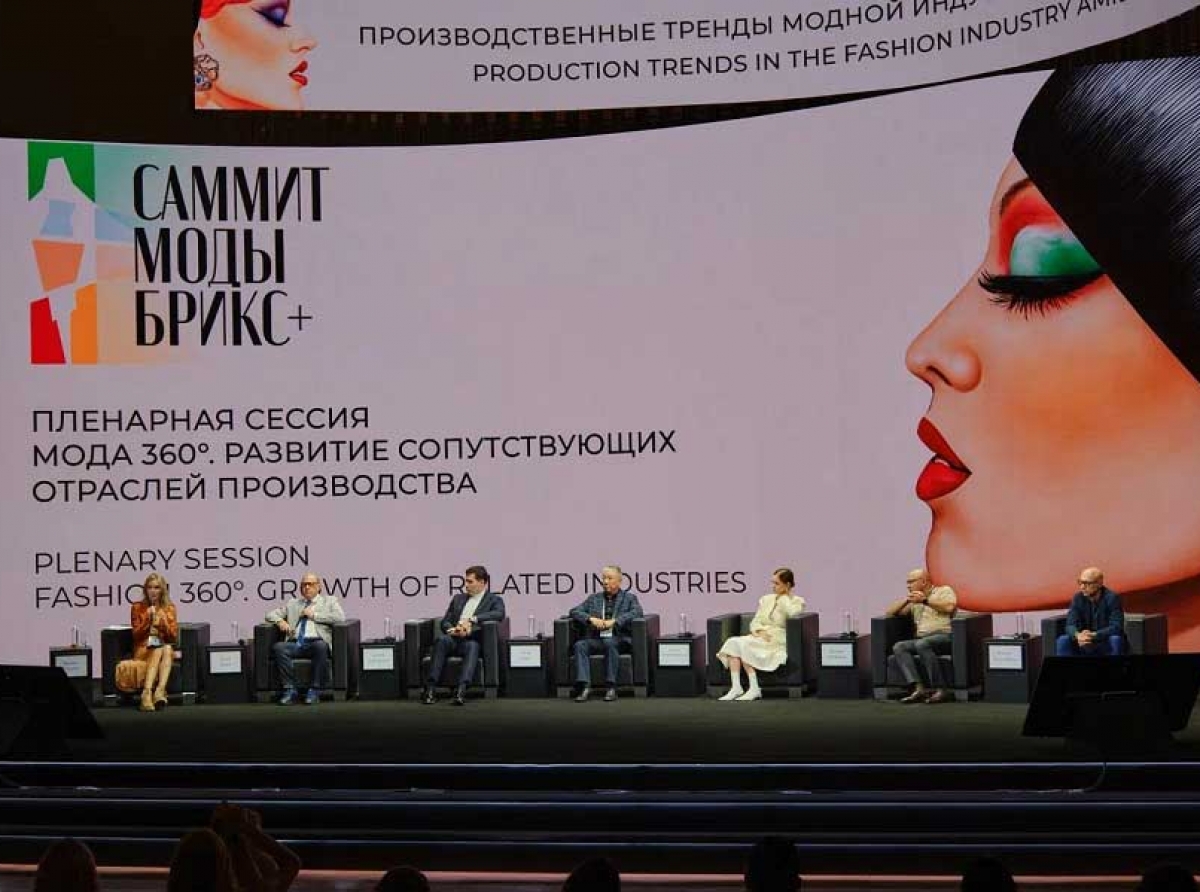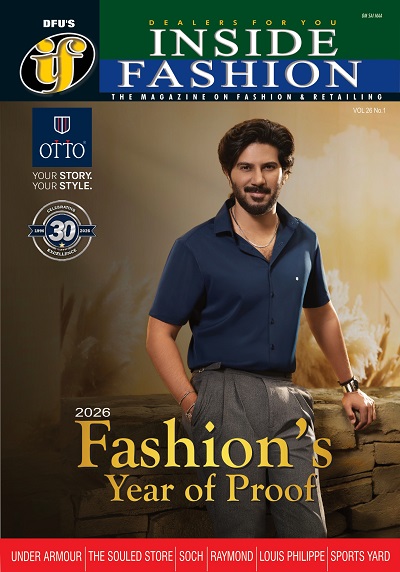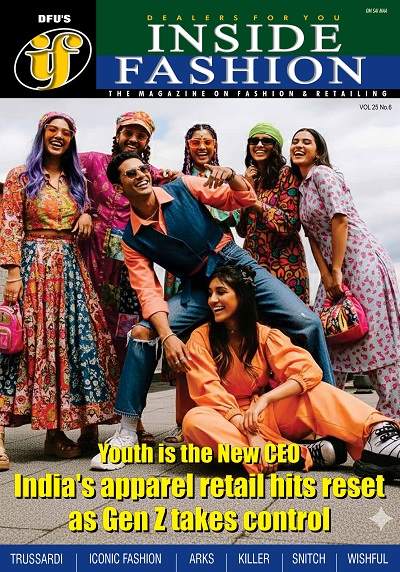BRICS+ Fashion Summit: Global reflections and key takeaways for the Indian fashion, apparel Industry”

The BRICS+ Fashion Summit, held together with Moscow Fashion Week (Aug 28-September 02, 2025) a pivotal international platform held in Moscow, has offered invaluable insights for the Indian fashion and apparel industry navigating a dynamic global landscape.
Read our latest issue
Beyond the runway glamour, the three-day event provided a masterclass in strategy, sustainability, and cultural positioning, with a clear consensus emerging from international speakers: the future of fashion is rooted in authenticity, powered by technology, and defined by a collaborative, borderless vision.
The power of cultural identity and local craftsmanship
For Indian designers, a key takeaway from the summit is the strategic advantage of leveraging national identity. Speakers from across the globe emphasized that in a saturated market, cultural heritage is a powerful competitive differentiator.
Hind Joudar, Founder and CEO of Morocco Fashion Week, highlighted the imperative for intellectual property protection of traditional crafts. She noted that while centuries-old Moroccan crafts have become a "recognized global brand," they face a crucial challenge: "Economic opportunity is vital, but it must respect ancestral traditions and operate fairly."
This resonates deeply with India's own rich artisanal heritage, underscoring the need for legal frameworks to protect traditional textiles and embroidery.
Similarly, Marina Banović, Vice President of Montenegro Fashion Week, shared a powerful case study of her brand's collaboration with the local community to create a commercial line, ensuring the creators of the original patterns receive due recognition and benefit.
The discussion on cultural diplomacy further cemented this point. Ozlem Sahin Ertas, Founder and CEO of Think Fashion Global from Turkey, articulated how fashion can be a "diplomatic tool" to celebrate the "richness of all cultures." This message is a clarion call for Indian brands to act as cultural ambassadors, showcasing the subcontinent’s unique design narratives on the global stage.
Technology as an enabler, not a replacement The summit's discussions on technology offered a balanced perspective that is highly relevant to India's burgeoning fashion-tech sector. Speakers agreed that while AI and digitalization are essential, they are meant to assist, not replace, human creativity and traditional skills.
According to Maria Shevchenko, Creative Director of Russia's 3dcouture, AI "helps bring imagination to life but does not replace the human element." The sentiment was echoed by Italian speakers, with Antonio Alizzi, a strategic director from Commerson Ltd, comparing AI to an "architect's assistant."
A striking anecdote from Bernardo Paoli of Italy's Studies&Careers highlighted this: a brand owner told him he would "exchange all my AI specialists for them" if he could find a good patternmaker. This points to a critical skills gap and the enduring value of traditional craftsmanship.
Furthermore, a speaker from the Regional Session on Asia, Jay Ishak of MyFashionChamber Malaysia, outlined "technological partnerships" as a key area for international collaboration, especially for sharing knowledge on integrating modern technologies and blockchain. This is an area ripe for B2B partnerships between Indian and global firms.
Embracing sustainability and circular models
The global push for sustainability was a recurring theme, with a focus on practical and scalable solutions. Patrick Duffy, founder of Global Fashion Exchange in the USA, shared his success in convincing major corporations like H&M to engage in closed-loop systems, a model that he proved can "increase profitability."
The summit also shone a light on innovative materials. Anna Bikchurova, a Russian fabric specialist, revealed that fabrics made from mushrooms, lotus, and even carbon dioxide are already entering the international industry.
Liliek Setiawan, CEO of Sekar Lima from Indonesia, highlighted the problem of high cost for eco-friendly fibers like banana leaves and bamboo due to low demand, proposing a solution that all participants "wear clothing made only from natural fibers" to drive demand and scale production.
This presents a potential challenge for Indian manufacturers but also an opportunity to invest in sustainable raw materials.
A shift in trendsetting and marketing
The summit's public talk on trends confirmed a tectonic shift in how fashion is shaped. François Schweitzer, General Merchandising Manager of the UAE-based Etoile Group, noted that "society feels fatigued by high fashion; people want individuality, and inspiration comes from the streets." Soodol Huh, an editor from South Korea, concluded that "trends are no longer dictated from above... future trendsetters will be ordinary people."
This "bottom-up" trend model, which is prevalent on social media, requires Indian brands to rethink their marketing strategies.
Instead of solely relying on celebrity endorsements, the focus should shift to creating relatable, community-driven content that connects with consumers on an emotional level.
Strategic market entry and global collaboration
For Indian brands looking to expand internationally, speakers provided pragmatic advice. Mihajlo Matković, a managing partner at Mpartners. legal in Serbia, stressed the foundational importance of "trademark protection" and understanding both national legal frameworks and cultural nuances for successful international campaigns.
Jay Ishak from Malaysia identified market access and bilateral agreements as one of the five crucial areas for collaboration.
He cited an agreement with Madrid that allows Malaysian designers to participate in fashion events worldwide, a model that could be replicated by Indian fashion councils to create global opportunities.
BRICS+ Fashion Summit was a forum for strategic dialogue.
It provided a clear blueprint for the Indian fashion industry: to succeed globally, brands must lead with their unique cultural identity, use technology to enhance human skill, embrace sustainable practices, and pursue strategic collaborations that open new doors.
The global stage is ready for Indian fashion, but success will hinge on the industry's ability to translate these learnings into actionable business strategies.












